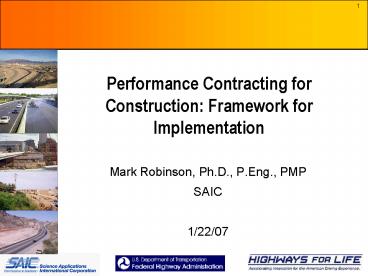Performance Contracting for Construction: Framework for Implementation - PowerPoint PPT Presentation
1 / 14
Title:
Performance Contracting for Construction: Framework for Implementation
Description:
previous file name: trb2007MarkRobinson-P07-0210.ppt ... Title: VSL Author: Robinson and Zineddin Last modified by: Sid Scott Description – PowerPoint PPT presentation
Number of Views:555
Avg rating:3.0/5.0
Title: Performance Contracting for Construction: Framework for Implementation
1
Performance Contracting for Construction
Framework for Implementation
- Mark Robinson, Ph.D., P.Eng., PMP
- SAIC
- 1/22/07
2
Overview
- Why Performance Contracting for Construction?
- Framework Purpose
- Stakeholder Involvement
- Framework Contents
- Relation to the Highways for LIFE Program
- Lessons Learned
- Pilot Program
- Next Steps
3
Why Performance Contracting for Construction?
- Much of Americas transportation infrastructure
is reaching the end of its design life and needs
to be re-constructed - Traffic levels and the resulting congestion
levels continue to increase - FHWA is developing, identifying, and promoting
new methods to reconstruct highways and bridges
safer, faster, and better - Using performance contracting will allow State
and local agencies to define and communicate to
contractors specifically what they want to
achieve - Contractors will have the flexibility to
determine how they do the work
4
Some Pros and Cons
- Pros
- Introduction of Innovation
- Defined Outcomes
- Contractor Flexibility
- Share of risk and rewards
- Cons
- New approach that requires a culture shift
- May not be applicable to all projects
5
Framework Purpose
- To provide State and local agencies with
processes and materials that they can use to
accelerate the development of a performance
contract solicitation package for construction
contracts - Meant to be used as a reference guide
- Should help agencies to avoid common obstacles
and pitfalls
6
Stakeholder Involvement
- The project team developed the materials working
with - A select group of stakeholders from State DOTs
and Industry - Provided guidance and review at the 30, 60, and
90 stages - Subject matter experts from FHWA
7
State DOT and Industry Stakeholder Group
- Scott Jarvis - Caltrans
- Chuck Suszko - Caltrans
- Gene Mallette - Caltrans
- Peggy Chandler - Texas DOT
- Steve DeWitt - North Carolina DOT
- Kevin Dayton - Washington State DOT
- Dexter Newman - the Kentucky Cabinet
- Sid Scott - Trauner Consulting
- Brian Deery - AGC
- Bob Lanham - Williams Brothers Construction-
- Brian Burgett - Kokosing Construction
- Rich Juliano - ARTBA
Note Participation did not involve formal
endorsement of the final product
8
FHWA Subject Matter Experts
- Jim Sorenson
- Mary Huie
- Byron Lord
- Ken Jacoby
- King Gee
- Jerry Yakowenko
- Tracy Scriba
- Chung Eng
- Rudy Umbs
- John Baxter
- Mark Swanlund
- Peter Kopac
- Christopher Schneider
- David Geiger
- Tom Deddens
- Gus Shanine
- Rob Elliott
- Evan Wisniewski
- Jim Hatter
- John Bukowski
- Fred Skaer
- Shari Schaftlein
- Myint Lwin
- And others
9
Framework Contents
- Overall process for performance contract
development - Guidance on selecting appropriate projects
- Processes, lessons learned, and sample
solicitation package materials for - Performance Goals
- Measurement Methodology
- Enhanced Low Bid Award Process
- Best Value Award Process
- SEP-14 Process
10
Relation to the Highways for LIFE (HfL) Program
- HfLs mission is to improve the driving
experience of the American public - HfL is looking for new ways to build highways and
bridges safer, faster, better, and less costly - Performance contracting will be a tool in the HfL
toolbox - HfL projects are not required to use performance
contracting - Additional consideration will be given to
projects that propose to use performance
contracting
11
Lessons Learned
- Each project will be different Processes,
goals, and materials will need to be tailored to
the individual application - Performance goals should be SMART Specific,
Measurable, Achievable, Results-Oriented, and
Timely - Performance goals MUST be under the influence of
the contractor - The contractor must have flexibility in how they
perform the work - Ideally, the performance-based environment will
start at the concept or design stage
12
Pilot Program
- FHWA is currently seeking 4 to 8 agencies that
are interested in piloting the Performance
Contracting Framework. - Pilot states will receive tailored technical
assistance to help them implement this approach - Pilot states can propose the use of the framework
as an innovative approach when applying for
funding under the Highways for LIFE Program - For more information on becoming a pilot agency,
contact Mary Huie at mary.huie_at_dot.gov or
202-366-3039
13
Next Steps
- Perform outreach to recruit agencies to pilot the
framework - Provide technical assistance to 4 to 8 pilot
projects - Capture information on successes and lessons
learned - Prepare case study documents on each pilot
application - Revise and update the Framework for broader
release
14
For More Information
- Jim Sorenson, FHWA
- james.sorenson_at_dot.gov, 202-366-1333
- Mary Huie, FHWA
- mary.huie_at_dot.gov, 202-366-3039
- Mark Robinson, SAIC
- mark.d.robinson_at_saic.com, 703-676-2384































